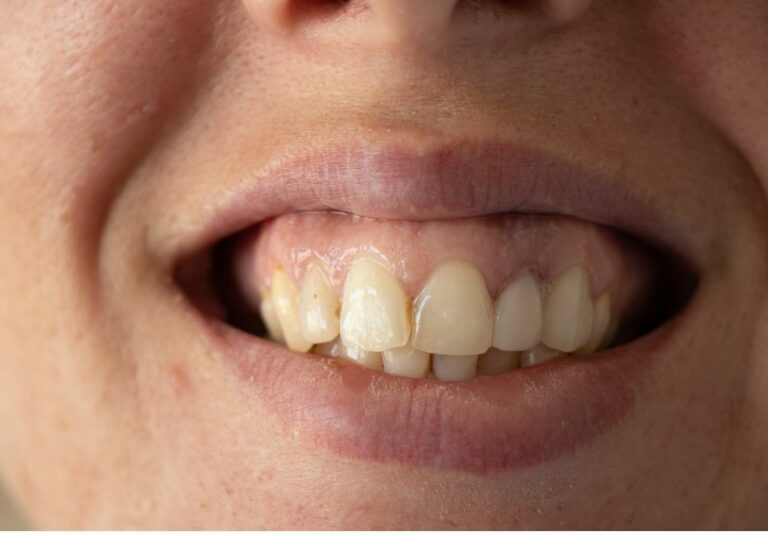Do you wish you had longer teeth? Are you self-conscious about your gummy smile? If so, you may have wondered if veneers can make your teeth longer.
Porcelain veneers are a popular cosmetic dental treatment that can improve the appearance of your teeth. They are thin shells of porcelain that are placed over the front of your teeth, covering imperfections such as chips, stains, and gaps. While veneers can make your teeth look whiter and more uniform, can they also make them longer?
The answer is yes, veneers can make your teeth appear longer. If your teeth are shorter than you would like or if you have a gummy smile, veneers can help to create a more balanced and aesthetically pleasing smile. However, there are limitations to how much length can be added, as excessively long teeth can interfere with your ability to bite and chew. In this article, we will explore the benefits and limitations of using veneers to make your teeth longer.
Understanding Veneers
If you’re looking to improve the appearance of your teeth, veneers may be a viable option for you. Veneers are thin, custom-made shells that are designed to cover the front surface of your teeth. They can be used to improve the appearance of teeth that are discolored, chipped, misshapen, or have gaps between them.
What Are Veneers?
Veneers are made from either porcelain or composite resin material. Porcelain veneers are more durable and stain-resistant, while composite veneers are less expensive and can be applied in a single visit to the dentist.
To apply veneers, your dentist will first remove a small amount of enamel from the surface of your teeth. This is to ensure that the veneers will fit properly and look natural. Once the enamel has been removed, your dentist will take an impression of your teeth and send it to a dental laboratory, where your veneers will be custom-made.
When your veneers are ready, your dentist will bond them to the front surface of your teeth using a special dental adhesive. The process is generally painless and can be completed in two or three visits to the dentist.
Types of Veneers
There are two main types of veneers: porcelain veneers and composite veneers.
Porcelain veneers are made from a thin shell of porcelain that is custom-made to fit over the front surface of your teeth. They are more durable and stain-resistant than composite veneers and can last for up to 15 years with proper care.
Composite veneers, on the other hand, are made from a tooth-colored resin material that is applied directly to the front surface of your teeth. They are less expensive than porcelain veneers and can be applied in a single visit to the dentist.
In conclusion, veneers are a popular cosmetic dental treatment that can improve the appearance of your teeth. They are available in both porcelain and composite resin materials, and can be used to correct a variety of dental imperfections. If you’re considering veneers, talk to your dentist to determine which type is right for you.
Veneers and Teeth Lengthening

If you have small or short teeth, you may be wondering if veneers can help you achieve a longer and more proportionate smile. The good news is that veneers can be an effective solution for lengthening teeth and improving the overall appearance of your smile. In this section, we will explore how veneers can lengthen teeth and the procedure involved.
How Veneers Can Lengthen Teeth?
Veneers are thin, custom-made shells that are placed over the front surface of your teeth to improve their appearance. They can be made from porcelain or composite resin, and are designed to match the color and shape of your natural teeth.
To lengthen teeth with veneers, your dentist will need to remove a small amount of enamel from the surface of your teeth. This will create space for the veneers to be placed without making your teeth look bulky or unnatural. Once the enamel has been removed, your dentist will take impressions of your teeth to create custom veneers that fit perfectly over your teeth.
Veneers can be used to lengthen teeth that are too short or small, as well as to close gaps between teeth. They can also be used to improve the shape and color of your teeth, giving you a more attractive and confident smile.
Procedure for Teeth Lengthening with Veneers
The process of getting veneers to lengthen your teeth typically involves several steps. Here is a general overview of what you can expect:
- Consultation: Your dentist will examine your teeth and discuss your goals and expectations for treatment. They will also explain the pros and cons of veneers and answer any questions you may have.
- Preparation: Your dentist will prepare your teeth by removing a small amount of enamel from the surface of your teeth. They will also take impressions of your teeth to create custom veneers.
- Temporary Veneers: While your permanent veneers are being made, your dentist may place temporary veneers over your teeth to protect them and give you an idea of what your final results will look like.
- Bonding: Once your permanent veneers are ready, your dentist will bond them to the surface of your teeth using a special adhesive. They will then shape and polish the veneers to ensure a perfect fit and natural-looking results.
- Follow-Up: Your dentist will schedule a follow-up appointment to check the fit and function of your veneers and make any necessary adjustments.
Overall, veneers can be an effective solution for lengthening teeth and improving the appearance of your smile. If you are considering veneers for teeth lengthening, be sure to consult with a qualified and experienced cosmetic dentist to ensure the best possible results.
Benefits of Teeth Lengthening with Veneers
If you’re looking to enhance your smile, veneers are a great option to consider. Veneers can help you achieve the perfect smile by lengthening your teeth. Here are some benefits of teeth lengthening with veneers:
- Improved appearance: Veneers can help you achieve a more symmetrical and uniform smile by lengthening your teeth. This can improve the overall appearance of your smile and boost your confidence.
- Minimally invasive procedure: Teeth lengthening with veneers is a minimally invasive procedure that requires little to no tooth reduction. This means that the procedure is less painful and requires less recovery time compared to other dental procedures.
- Durable and long-lasting: Veneers are made of high-quality materials that are durable and long-lasting. With proper care, veneers can last for many years and provide you with a beautiful smile for a long time.
- Stain-resistant: Veneers are stain-resistant, so you don’t have to worry about your teeth becoming discolored over time. This means that you can enjoy a bright and beautiful smile without having to worry about staining.
- Customizable: Veneers are customizable, which means that you can choose the size, shape, and color of your veneers to achieve the perfect smile. Your dentist will work with you to create a customized treatment plan that meets your specific needs and goals.
Overall, teeth lengthening with veneers is a great option for anyone looking to improve the appearance of their smile. With its many benefits, veneers can help you achieve the perfect smile you’ve always wanted.
Potential Risks and Complications

While dental veneers are generally considered safe, there are potential risks and complications to consider before getting them. Here are a few things to keep in mind:
Tooth Sensitivity
After getting veneers, you may experience increased tooth sensitivity to hot and cold temperatures. This is because a small amount of enamel is removed from the tooth during the veneer preparation process. While this sensitivity is usually temporary, it can last for several weeks or months.
Damage to Veneers
Veneers are not indestructible and can be damaged just like natural teeth. If you bite down on something hard or suffer a blow to the face, your veneers may crack or chip. In some cases, the veneer may even come loose from the tooth.
Decay
While veneers themselves cannot decay, the underlying tooth structure can still be affected by cavities. It’s important to maintain good oral hygiene habits, such as brushing and flossing regularly, to prevent decay from forming under the veneers.
Gum Irritation
In some cases, the placement of veneers can cause gum irritation or inflammation. This may be due to the shape or size of the veneer, which can create a small gap between the veneer and the gum line. If this occurs, your dentist may need to adjust the veneer to alleviate the irritation.
Color Matching
While veneers are designed to match the color of your natural teeth, it can be difficult to achieve a perfect match. This is especially true if you have discolored or stained teeth. Your dentist may need to use a slightly lighter shade of veneer to achieve a more natural-looking result.
Overall, while there are potential risks and complications with getting veneers, they are generally considered safe and effective for improving the appearance of your teeth. As always, it’s important to discuss all of your options with your dentist to determine if veneers are the right choice for you.
Maintaining Your Veneers
When you invest in veneers to improve the look of your teeth, it’s important to take care of them properly. Here are some tips to help you maintain your veneers and ensure they last as long as possible.
Veneer Aftercare
After getting veneers, it’s important to follow some basic aftercare instructions to ensure they stay in good condition. Here are some tips to keep in mind:
- Avoid eating hard or crunchy foods that could damage your veneers.
- Brush your teeth twice a day with a non-abrasive toothpaste and floss regularly to keep your veneers clean.
- Avoid biting your nails or using your teeth to open packages, as this could damage your veneers.
- If you grind your teeth at night, talk to your dentist about getting a nightguard to protect your veneers.
Longevity of Veneers
With proper care, veneers can last for many years. However, they may need to be replaced eventually due to wear and tear or other factors. Here are some things to keep in mind about the longevity of veneers:
- Veneers typically last between 10 and 15 years, but they can last longer with proper care.
- If you notice any damage to your veneers, such as cracks or chips, see your dentist right away to have them repaired.
- Regular dental checkups can help ensure that your veneers are in good condition and catch any potential issues early on.
By following these tips and taking good care of your veneers, you can enjoy a beautiful, healthy smile for years to come.
Cost and Financing of Veneers

Veneers are a popular cosmetic dental treatment that can help improve the appearance of your teeth. However, one of the biggest concerns for many people is the cost of the procedure. In this section, we will discuss the cost and financing options for veneers.
Cost of Veneers
The cost of veneers can vary depending on several factors, including the type of veneer, the number of teeth being treated, and the location of the dental office. According to the American Dental Association, veneers typically cost between $925 and $2,000 per tooth. However, some types of veneers, such as porcelain veneers, can cost up to $2,500 per tooth.
It’s important to note that the cost of veneers is usually not covered by dental insurance, as it is considered a cosmetic procedure. Therefore, you will likely need to pay for the procedure out of pocket.
Financing Options for Veneers
If the cost of veneers is a concern for you, there are several financing options available to help make the procedure more affordable. Some of the most common financing options include:
- Payment plans: Many dental offices offer payment plans that allow you to pay for the procedure over time. These plans typically require a down payment and monthly payments over a set period of time.
- Credit cards: Some people choose to pay for veneers using a credit card. This option can be convenient, but it’s important to make sure you can pay off the balance before interest charges accrue.
- Dental loans: Some lenders offer loans specifically for dental procedures, including veneers. These loans typically have lower interest rates than credit cards, but you will need to apply and be approved for the loan.
- Dental savings plans: Some dental savings plans offer discounts on cosmetic procedures, including veneers. These plans typically require a monthly or annual fee, but they can help you save money on the cost of the procedure.
When considering financing options for veneers, it’s important to carefully review the terms and conditions of each option to ensure you can afford the payments and understand the interest rates and fees.
In conclusion, the cost of veneers can vary depending on several factors, and financing options are available to help make the procedure more affordable. If you are considering veneers, be sure to discuss the cost and financing options with your dentist to determine the best course of action for your budget and dental needs.
Frequently Asked Questions
How can I make my teeth appear longer with veneers?
Veneers can be used to make your teeth appear longer by adding a layer of porcelain or composite resin to the front of your existing teeth. This can help to close gaps between teeth and improve the overall appearance of your smile. Your dentist will work with you to determine the best approach for achieving the desired length for your teeth.
What is the process for getting veneers to fix uneven teeth length?
The process for getting veneers to fix uneven teeth length typically involves several steps. First, your dentist will examine your teeth and determine the best approach for achieving the desired results. Next, they will prepare your teeth by removing a small amount of enamel to make room for the veneers. Finally, they will place the veneers onto your teeth using a special adhesive.
What are the risks of getting veneers to make teeth appear longer?
Like any dental procedure, there are risks associated with getting veneers. These can include tooth sensitivity, gum irritation, and the possibility of the veneers becoming loose or falling off. Your dentist will discuss these risks with you before the procedure and work with you to minimize the chances of any complications.
How long do veneers last when used to make teeth longer?
Veneers can last for many years when properly cared for. However, the lifespan of your veneers will depend on several factors, including the materials used, your oral hygiene habits, and the amount of wear and tear they are subjected to. Your dentist can give you a better idea of how long you can expect your veneers to last based on your individual circumstances.
Can veneers be used to fix small teeth and make them appear longer?
Yes, veneers can be used to fix small teeth and make them appear longer. This is a common cosmetic dental procedure that can help to improve the overall appearance of your smile. Your dentist will work with you to determine the best approach for achieving the desired results.
What should I expect during the recovery process after getting veneers to make teeth longer?
The recovery process after getting veneers to make teeth longer is typically minimal. You may experience some sensitivity or discomfort in the days following the procedure, but this should subside quickly. Your dentist will provide you with specific instructions on how to care for your veneers and what to expect during the recovery process.







